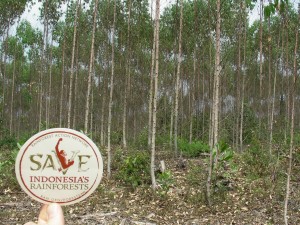
RAN has been campaigning since 2009 to persuade Asia Pulp and Paper (APP) to reform its destructive business practices. To that end, we have worked with dozens of major companies to develop policies that eliminate paper associated with rainforest destruction from their supply chains, including, most recently, Disney and HarperCollins.
With APP’s newly announced Forest Conservation Policy, paper purchasers and investors who have avoided doing business with APP in the past may wonder if the time has come to reconsider. RAN’s position is described below.
To Whom It May Concern,
On February 5 Asia Pulp and Paper (APP), the largest paper company in Indonesia and the third largest in the world, announced a new “Forest Conservation Policy” to undertake environmental and social reforms to its business practices. APP has become notorious in international markets for the exceptionally negative environmental, climate and human rights footprints of its operations.
The APP announcement is a testament to the positive collective impact that the actions of almost 100 international corporate customers, including Disney, Staples and Mattel, have had by refusing to purchase papers linked to tropical deforestation, land and social conflicts with local communities and human rights violations.
RAN welcomes APP’s new rainforest commitments as an important milestone. It includes commitments related to peatlands, engagement with local communities, and protection of high conservation value areas and high carbon stock forests.
APP’s commitments[1], which went into effect February 1, apply to both lands controlled directly by the company and lands controlled by their suppliers – about half of APP’s paper fiber comes from ‘independent’ suppliers, including fiber from the clearing of rainforests and drainage of peatlands.
The company says it will defer clearing and conversion of natural forests and carbon-rich peatlands while conservation and carbon values are assessed. It is still uncertain when the deferred logging will resume and whether the company will stop the use of natural tropical rainforest fiber in all of their mills. In addition, the commitment acknowledges the company’s problems associated with land conflict, and recognizes that indigenous and local communities may have customary rights to land that APP would like to use for its pulp plantations. The company must now work with stakeholders to develop, announce and meet detailed implementation plans including performance targets, benchmarks and timetables related to their environmental and social promises. It must also put in place transparent systems for independent monitoring, reporting and verification of its implementation plans.
APP’s new commitment is just the starting point, not the finish line. The hidden story here is the controversial paper giant’s long and deep history of broken promises, land conflicts and human rights violations across its operations. The lesson learned again and again is the essential importance of clear measurable implementation measures and mechanisms, implemented in close cooperation with key stakeholders, including NGOs, and confirmed by credible, independent verification. It is still too early to say if APP’s latest commitments will bear fruit, as we all hope they will, or withers on the vine as has happened too consistently in the past.
For potential buyers of APP products and investors in the company, the key take away is that APP should not be seen as a responsible company in the marketplace and companies should not consider doing business with APP or its affiliates until independent verification confirms that APP’s new commitments have been implemented and that it is constructively resolving the devastating rainforest and human rights crises it has caused in Indonesia.
More information on the APP announcement and specific social and environmental challenges the company is facing can be found in this statement on our website.
Sincerely,
Lafcadio Cortesi, Asia Director and Robin Averbeck, Forest Campaigner, Rainforest Action Network